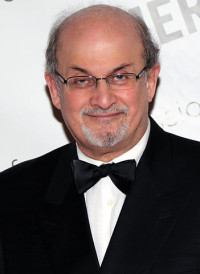Two Years, Eight Months and Twenty-Eight Nights

Salman Rushdie, Festival of Ideas
St George’s Hall, Bristol, 11 October
On Sunday afternoon I saw Salman Rushdie in the flesh! Rushdie was visiting Bristol to promote his new novel Two Years Eight Months & Twenty-Eight Nights (a title his publishers apparently thought cumbersome). St George’s Hall was packed to the rafters with fans keen to hear, well, pretty much anything the great man had to say, though he stayed mostly on topic.
The new novel was written in part as a reaction against the act of writing memoir (Rushdie’s previous book, Joseph Anton, documented his 10 years in hiding following the 1988 fatwa against him) – he felt an emotional desire to be at the opposite end of the spectrum, to make stuff up again. Rushdie was inspired by the Arabian Nights and here, as always, he feels he is part of the grand old tradition of non-naturalistic fiction – possibly the oldest form of world literature, encompassing fairy tales, heroic epics and other forms that seek to spread the collective wisdom of the human race.
Two Years Eight Months & Twenty-Eight Nights explores a near future described as “the time of strangeness” (which Rushdie feels could equally refer to the real world at the moment). The strangeness is caused by djinn – thoroughly evil djinn, unlike the djinn in his children’s book Haroun and the Sea of Stories – who are all descended from 12th century djinn princess Dunia who fell in love with a human. Rushdie joked that at one point in the writing of this thread of the novel he worried “Am I rewriting I Dream of Jeannie?”! To him, djinn represent our irrational darker side, arguably even our id. No matter how reasonable we try to be, we all have that within us.
This 12th century narrative includes the philosopher Ibn-Rushd, a figure from history who Rushdie’s father so admired that he changed their family name in honour of the man. When Rushdie looked into this figure so key to his identity, he discovered a man who was a progressive who was attacked for his beliefs and hounded into hiding – Rushdie joked how could his father have known how appropriate the name would prove!
The setting for most of the novel is “the day after tomorrow”, which gave Rushdie the freedom to write about familiar places without having real people in key roles such as the mayor of New York. This was partly because he didn’t want to go down the route of an unspecified time setting, which he feels makes the reader feel uprooted. Rushdie was happy to acknowledge that this aspect of alternate reality is a form of science fiction, though he was quick to point out that he himself is not scientific and at best he has put “cod science” into the book. When young he read a lot of SF but outside of the greats, he started to get frustrated with some of the common faults of the genre, such as overly masculine tropes and other types of bad writing. But he’s pleased with the rise of SF as the major genre in cinema, being a cinephile.
One of the book’s locations is New York, where Rushdie has now lived for 16 years. He feels he belongs in cities, having lived in three – he considers Bombay his home, is deeply connected to London but right now loves being in New York. He waxed lyrical about the crowd of stories in any city and how he had tried to write the literary equivalent of this by deliberately overpopulating the narrative with fragments of stories, each trying to push its way through the crowd. He loves the urgency and complication of life in a big city and even the way that they are usually disliked by the rest of the country, the metropolis and the hinterland at odds with each other constantly.
Rushdie is about to teach a course at NYU about non-fiction and has been reading up on the classics, such as In Cold Blood and Slouching Towards Bethlehem, in preparation. As he worried about how to cover such subjects as whether it’s legitimate to invent when telling a true story, I felt a stab of envy of those lucky students who will get to sit in a small room with this amazing man and discuss books and writing with him. He’s warm and funny, as well as supremely intelligent and well-read, and I dearly wish I could have thought of anything remotely interesting to say to him when I got my copy of the new book signed. But then a book signing is not the time for deep discussion. This is what I tell myself.
Two Years Eight Months & Twenty-Eight Nights is out now in hardback from Random House.